Motherhood and Mothering: Societal Views on Parenthood and Gender
VerifiedAdded on 2023/01/13
|6
|1312
|37
Essay
AI Summary
This essay delves into the multifaceted aspects of motherhood, examining the experiences of single, teenage, and queer mothers within a sociological framework. It explores how societal norms, gender roles, and cultural biases shape perceptions and treatment of these different groups of mothers. The essay analyzes the challenges faced by single mothers, the complexities of teenage motherhood, and the struggles and acceptance of queer mothers, highlighting the impact of privilege, social expectations, and the evolving definition of family. It draws on academic sources to critically evaluate the evolving landscape of motherhood, emphasizing the need for greater inclusivity and understanding. The essay concludes that the fulfillment of motherhood transcends biological factors and requires maturity and responsibility, irrespective of marital status or sexual orientation. The essay also emphasizes the importance of moving beyond traditional norms and embracing diverse family structures.
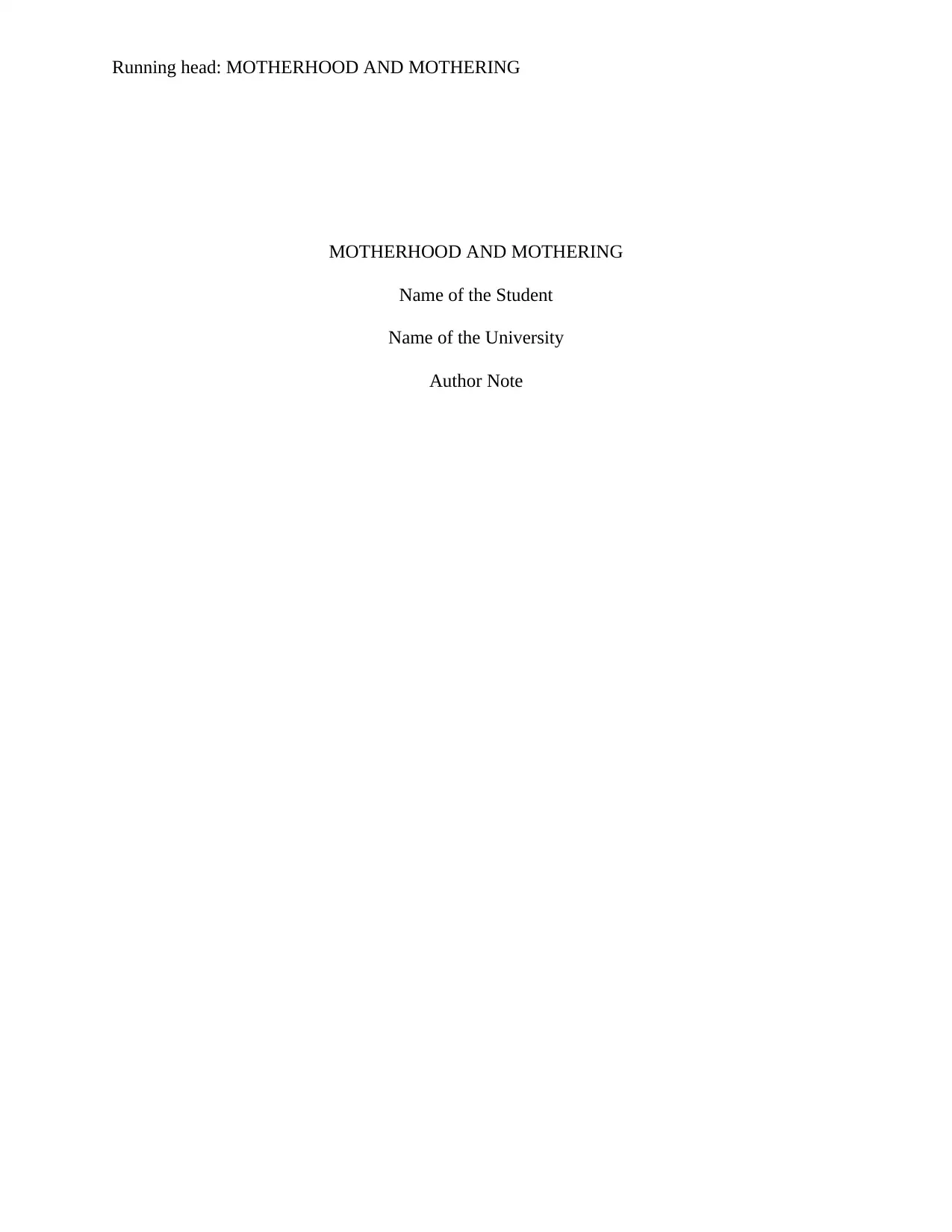
Running head: MOTHERHOOD AND MOTHERING
MOTHERHOOD AND MOTHERING
Name of the Student
Name of the University
Author Note
MOTHERHOOD AND MOTHERING
Name of the Student
Name of the University
Author Note
Paraphrase This Document
Need a fresh take? Get an instant paraphrase of this document with our AI Paraphraser
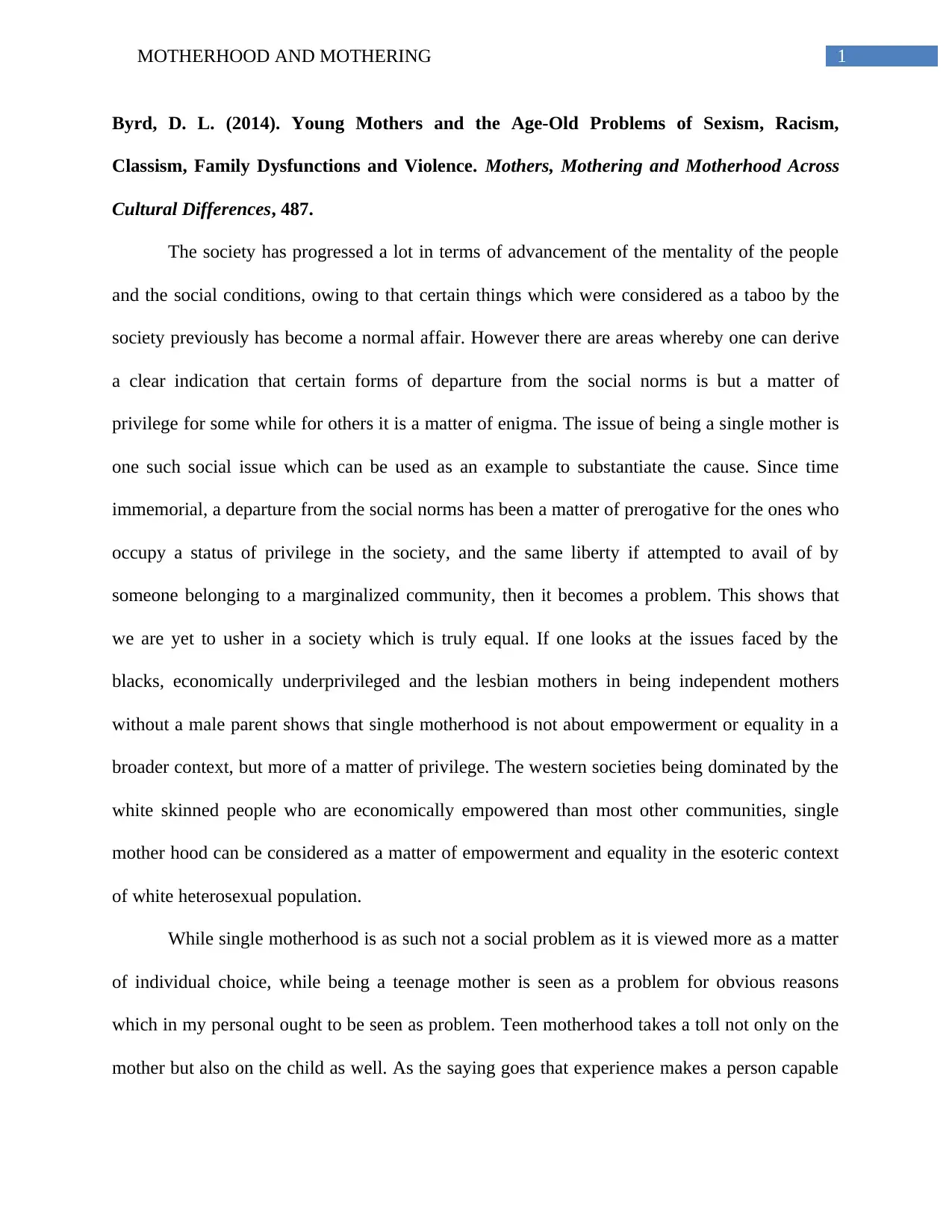
1MOTHERHOOD AND MOTHERING
Byrd, D. L. (2014). Young Mothers and the Age-Old Problems of Sexism, Racism,
Classism, Family Dysfunctions and Violence. Mothers, Mothering and Motherhood Across
Cultural Differences, 487.
The society has progressed a lot in terms of advancement of the mentality of the people
and the social conditions, owing to that certain things which were considered as a taboo by the
society previously has become a normal affair. However there are areas whereby one can derive
a clear indication that certain forms of departure from the social norms is but a matter of
privilege for some while for others it is a matter of enigma. The issue of being a single mother is
one such social issue which can be used as an example to substantiate the cause. Since time
immemorial, a departure from the social norms has been a matter of prerogative for the ones who
occupy a status of privilege in the society, and the same liberty if attempted to avail of by
someone belonging to a marginalized community, then it becomes a problem. This shows that
we are yet to usher in a society which is truly equal. If one looks at the issues faced by the
blacks, economically underprivileged and the lesbian mothers in being independent mothers
without a male parent shows that single motherhood is not about empowerment or equality in a
broader context, but more of a matter of privilege. The western societies being dominated by the
white skinned people who are economically empowered than most other communities, single
mother hood can be considered as a matter of empowerment and equality in the esoteric context
of white heterosexual population.
While single motherhood is as such not a social problem as it is viewed more as a matter
of individual choice, while being a teenage mother is seen as a problem for obvious reasons
which in my personal ought to be seen as problem. Teen motherhood takes a toll not only on the
mother but also on the child as well. As the saying goes that experience makes a person capable
Byrd, D. L. (2014). Young Mothers and the Age-Old Problems of Sexism, Racism,
Classism, Family Dysfunctions and Violence. Mothers, Mothering and Motherhood Across
Cultural Differences, 487.
The society has progressed a lot in terms of advancement of the mentality of the people
and the social conditions, owing to that certain things which were considered as a taboo by the
society previously has become a normal affair. However there are areas whereby one can derive
a clear indication that certain forms of departure from the social norms is but a matter of
privilege for some while for others it is a matter of enigma. The issue of being a single mother is
one such social issue which can be used as an example to substantiate the cause. Since time
immemorial, a departure from the social norms has been a matter of prerogative for the ones who
occupy a status of privilege in the society, and the same liberty if attempted to avail of by
someone belonging to a marginalized community, then it becomes a problem. This shows that
we are yet to usher in a society which is truly equal. If one looks at the issues faced by the
blacks, economically underprivileged and the lesbian mothers in being independent mothers
without a male parent shows that single motherhood is not about empowerment or equality in a
broader context, but more of a matter of privilege. The western societies being dominated by the
white skinned people who are economically empowered than most other communities, single
mother hood can be considered as a matter of empowerment and equality in the esoteric context
of white heterosexual population.
While single motherhood is as such not a social problem as it is viewed more as a matter
of individual choice, while being a teenage mother is seen as a problem for obvious reasons
which in my personal ought to be seen as problem. Teen motherhood takes a toll not only on the
mother but also on the child as well. As the saying goes that experience makes a person capable
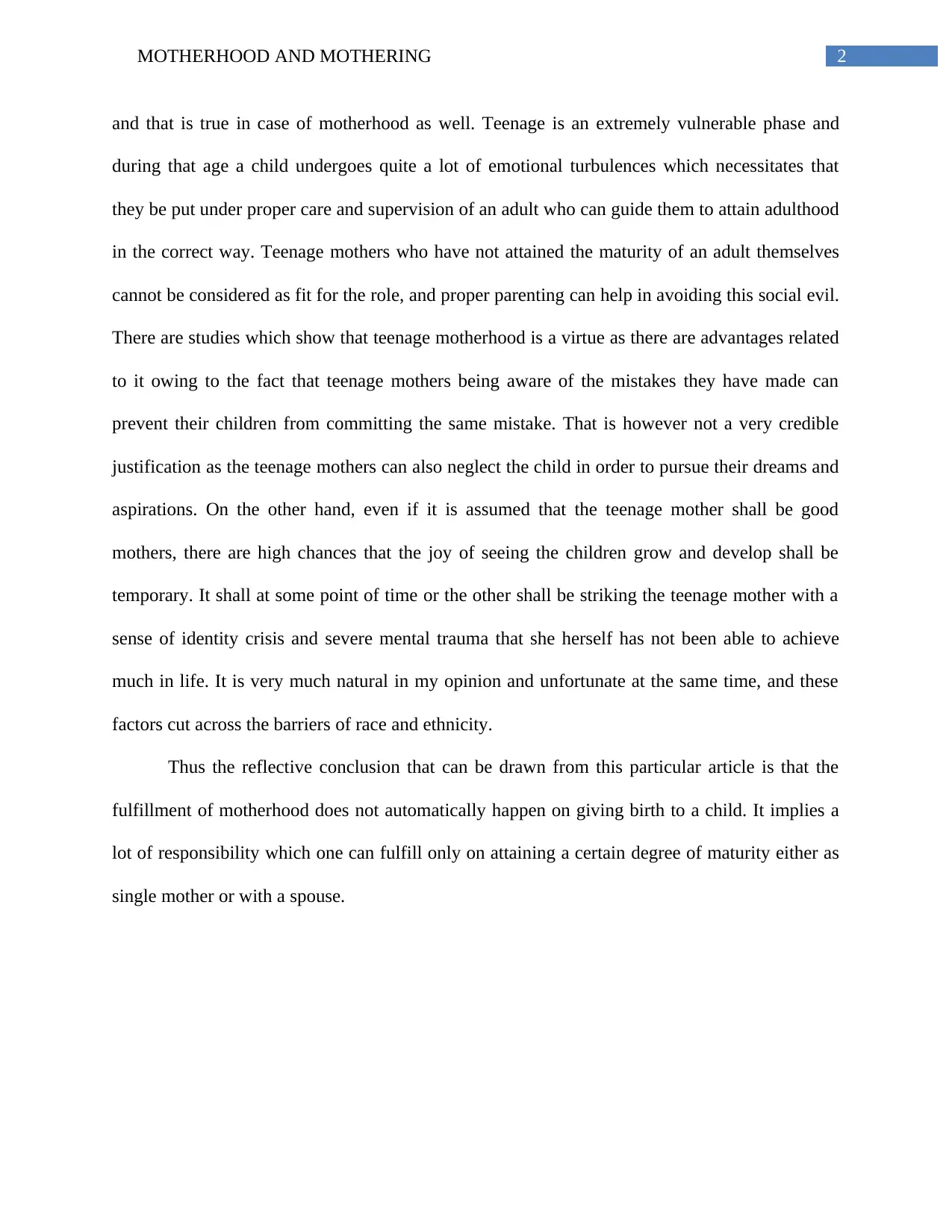
2MOTHERHOOD AND MOTHERING
and that is true in case of motherhood as well. Teenage is an extremely vulnerable phase and
during that age a child undergoes quite a lot of emotional turbulences which necessitates that
they be put under proper care and supervision of an adult who can guide them to attain adulthood
in the correct way. Teenage mothers who have not attained the maturity of an adult themselves
cannot be considered as fit for the role, and proper parenting can help in avoiding this social evil.
There are studies which show that teenage motherhood is a virtue as there are advantages related
to it owing to the fact that teenage mothers being aware of the mistakes they have made can
prevent their children from committing the same mistake. That is however not a very credible
justification as the teenage mothers can also neglect the child in order to pursue their dreams and
aspirations. On the other hand, even if it is assumed that the teenage mother shall be good
mothers, there are high chances that the joy of seeing the children grow and develop shall be
temporary. It shall at some point of time or the other shall be striking the teenage mother with a
sense of identity crisis and severe mental trauma that she herself has not been able to achieve
much in life. It is very much natural in my opinion and unfortunate at the same time, and these
factors cut across the barriers of race and ethnicity.
Thus the reflective conclusion that can be drawn from this particular article is that the
fulfillment of motherhood does not automatically happen on giving birth to a child. It implies a
lot of responsibility which one can fulfill only on attaining a certain degree of maturity either as
single mother or with a spouse.
and that is true in case of motherhood as well. Teenage is an extremely vulnerable phase and
during that age a child undergoes quite a lot of emotional turbulences which necessitates that
they be put under proper care and supervision of an adult who can guide them to attain adulthood
in the correct way. Teenage mothers who have not attained the maturity of an adult themselves
cannot be considered as fit for the role, and proper parenting can help in avoiding this social evil.
There are studies which show that teenage motherhood is a virtue as there are advantages related
to it owing to the fact that teenage mothers being aware of the mistakes they have made can
prevent their children from committing the same mistake. That is however not a very credible
justification as the teenage mothers can also neglect the child in order to pursue their dreams and
aspirations. On the other hand, even if it is assumed that the teenage mother shall be good
mothers, there are high chances that the joy of seeing the children grow and develop shall be
temporary. It shall at some point of time or the other shall be striking the teenage mother with a
sense of identity crisis and severe mental trauma that she herself has not been able to achieve
much in life. It is very much natural in my opinion and unfortunate at the same time, and these
factors cut across the barriers of race and ethnicity.
Thus the reflective conclusion that can be drawn from this particular article is that the
fulfillment of motherhood does not automatically happen on giving birth to a child. It implies a
lot of responsibility which one can fulfill only on attaining a certain degree of maturity either as
single mother or with a spouse.
⊘ This is a preview!⊘
Do you want full access?
Subscribe today to unlock all pages.

Trusted by 1+ million students worldwide
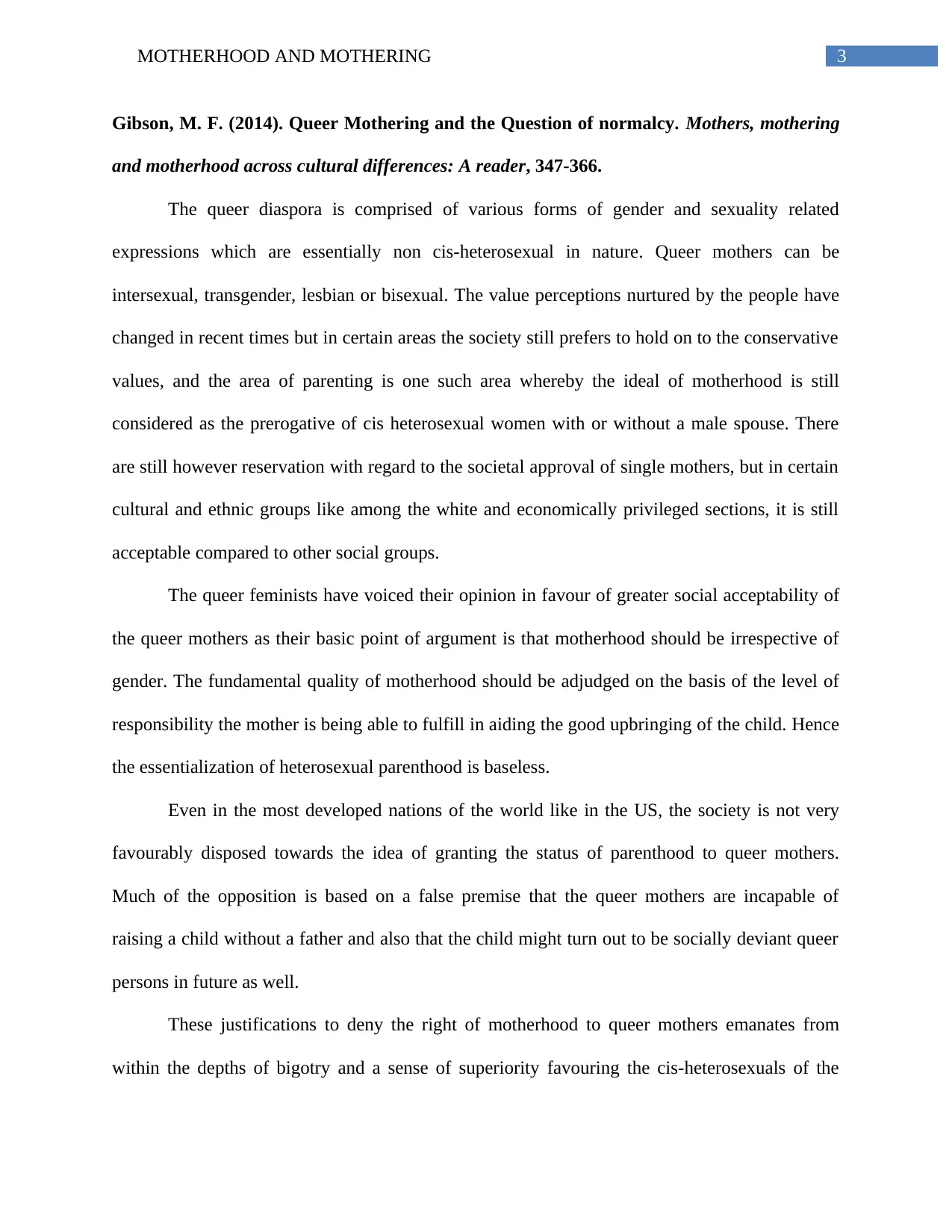
3MOTHERHOOD AND MOTHERING
Gibson, M. F. (2014). Queer Mothering and the Question of normalcy. Mothers, mothering
and motherhood across cultural differences: A reader, 347-366.
The queer diaspora is comprised of various forms of gender and sexuality related
expressions which are essentially non cis-heterosexual in nature. Queer mothers can be
intersexual, transgender, lesbian or bisexual. The value perceptions nurtured by the people have
changed in recent times but in certain areas the society still prefers to hold on to the conservative
values, and the area of parenting is one such area whereby the ideal of motherhood is still
considered as the prerogative of cis heterosexual women with or without a male spouse. There
are still however reservation with regard to the societal approval of single mothers, but in certain
cultural and ethnic groups like among the white and economically privileged sections, it is still
acceptable compared to other social groups.
The queer feminists have voiced their opinion in favour of greater social acceptability of
the queer mothers as their basic point of argument is that motherhood should be irrespective of
gender. The fundamental quality of motherhood should be adjudged on the basis of the level of
responsibility the mother is being able to fulfill in aiding the good upbringing of the child. Hence
the essentialization of heterosexual parenthood is baseless.
Even in the most developed nations of the world like in the US, the society is not very
favourably disposed towards the idea of granting the status of parenthood to queer mothers.
Much of the opposition is based on a false premise that the queer mothers are incapable of
raising a child without a father and also that the child might turn out to be socially deviant queer
persons in future as well.
These justifications to deny the right of motherhood to queer mothers emanates from
within the depths of bigotry and a sense of superiority favouring the cis-heterosexuals of the
Gibson, M. F. (2014). Queer Mothering and the Question of normalcy. Mothers, mothering
and motherhood across cultural differences: A reader, 347-366.
The queer diaspora is comprised of various forms of gender and sexuality related
expressions which are essentially non cis-heterosexual in nature. Queer mothers can be
intersexual, transgender, lesbian or bisexual. The value perceptions nurtured by the people have
changed in recent times but in certain areas the society still prefers to hold on to the conservative
values, and the area of parenting is one such area whereby the ideal of motherhood is still
considered as the prerogative of cis heterosexual women with or without a male spouse. There
are still however reservation with regard to the societal approval of single mothers, but in certain
cultural and ethnic groups like among the white and economically privileged sections, it is still
acceptable compared to other social groups.
The queer feminists have voiced their opinion in favour of greater social acceptability of
the queer mothers as their basic point of argument is that motherhood should be irrespective of
gender. The fundamental quality of motherhood should be adjudged on the basis of the level of
responsibility the mother is being able to fulfill in aiding the good upbringing of the child. Hence
the essentialization of heterosexual parenthood is baseless.
Even in the most developed nations of the world like in the US, the society is not very
favourably disposed towards the idea of granting the status of parenthood to queer mothers.
Much of the opposition is based on a false premise that the queer mothers are incapable of
raising a child without a father and also that the child might turn out to be socially deviant queer
persons in future as well.
These justifications to deny the right of motherhood to queer mothers emanates from
within the depths of bigotry and a sense of superiority favouring the cis-heterosexuals of the
Paraphrase This Document
Need a fresh take? Get an instant paraphrase of this document with our AI Paraphraser
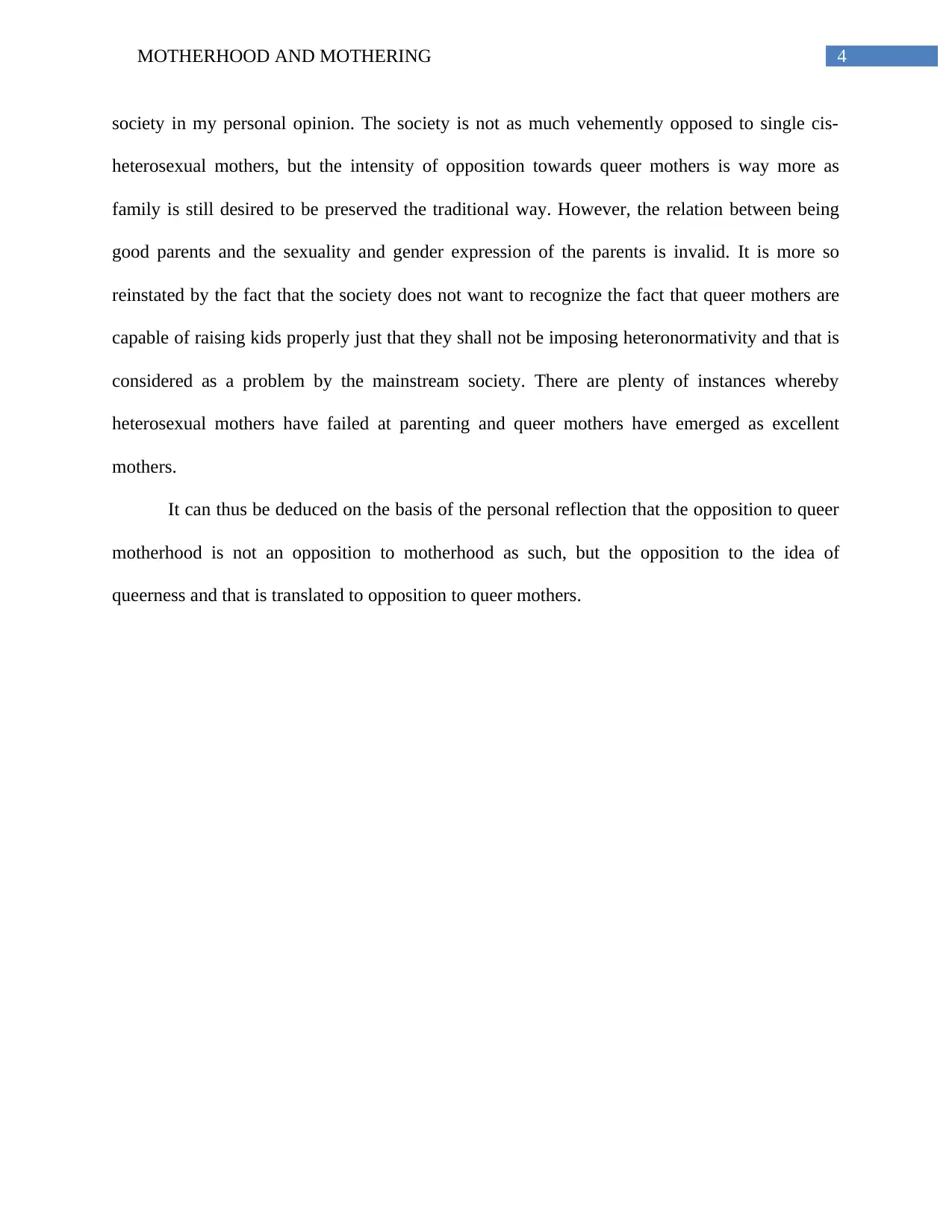
4MOTHERHOOD AND MOTHERING
society in my personal opinion. The society is not as much vehemently opposed to single cis-
heterosexual mothers, but the intensity of opposition towards queer mothers is way more as
family is still desired to be preserved the traditional way. However, the relation between being
good parents and the sexuality and gender expression of the parents is invalid. It is more so
reinstated by the fact that the society does not want to recognize the fact that queer mothers are
capable of raising kids properly just that they shall not be imposing heteronormativity and that is
considered as a problem by the mainstream society. There are plenty of instances whereby
heterosexual mothers have failed at parenting and queer mothers have emerged as excellent
mothers.
It can thus be deduced on the basis of the personal reflection that the opposition to queer
motherhood is not an opposition to motherhood as such, but the opposition to the idea of
queerness and that is translated to opposition to queer mothers.
society in my personal opinion. The society is not as much vehemently opposed to single cis-
heterosexual mothers, but the intensity of opposition towards queer mothers is way more as
family is still desired to be preserved the traditional way. However, the relation between being
good parents and the sexuality and gender expression of the parents is invalid. It is more so
reinstated by the fact that the society does not want to recognize the fact that queer mothers are
capable of raising kids properly just that they shall not be imposing heteronormativity and that is
considered as a problem by the mainstream society. There are plenty of instances whereby
heterosexual mothers have failed at parenting and queer mothers have emerged as excellent
mothers.
It can thus be deduced on the basis of the personal reflection that the opposition to queer
motherhood is not an opposition to motherhood as such, but the opposition to the idea of
queerness and that is translated to opposition to queer mothers.
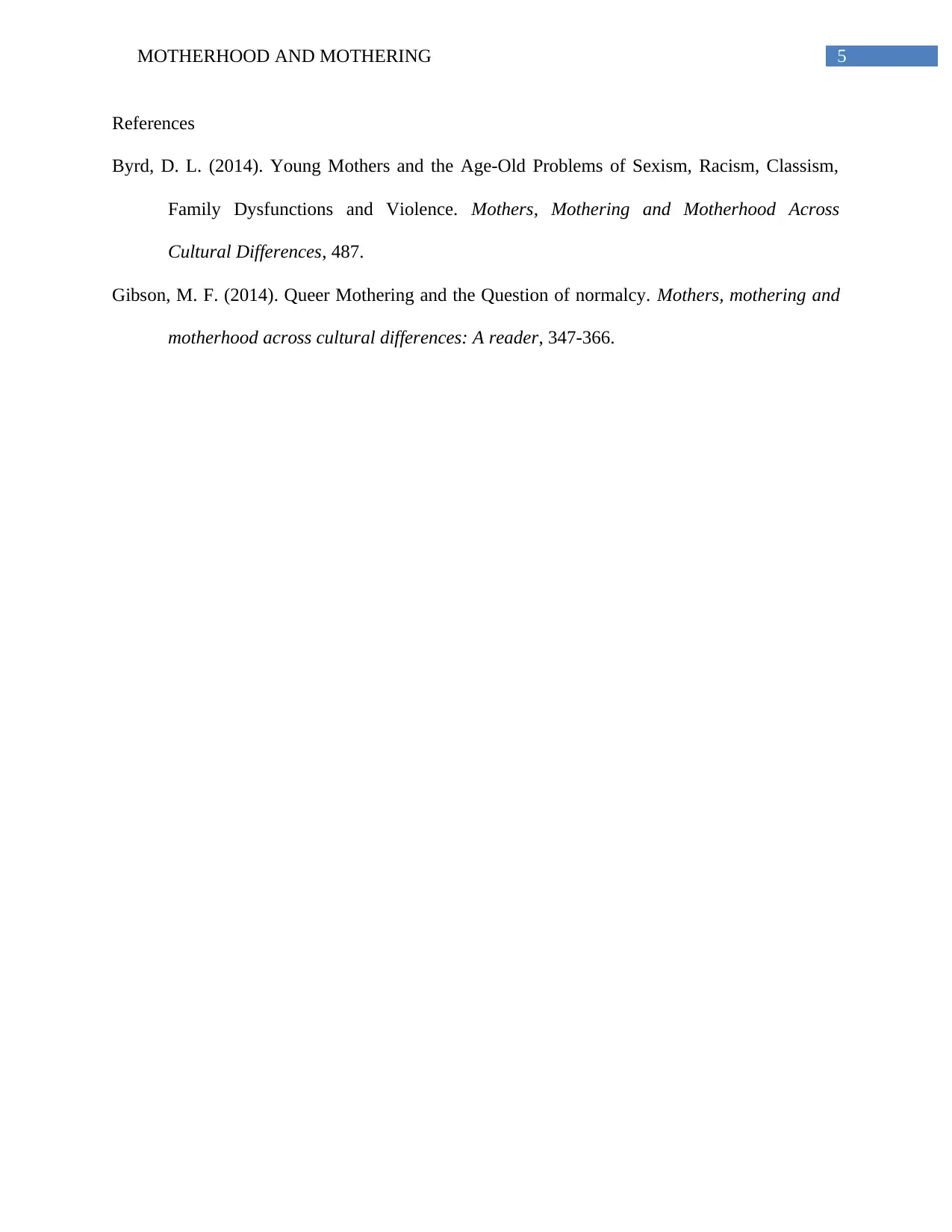
5MOTHERHOOD AND MOTHERING
References
Byrd, D. L. (2014). Young Mothers and the Age-Old Problems of Sexism, Racism, Classism,
Family Dysfunctions and Violence. Mothers, Mothering and Motherhood Across
Cultural Differences, 487.
Gibson, M. F. (2014). Queer Mothering and the Question of normalcy. Mothers, mothering and
motherhood across cultural differences: A reader, 347-366.
References
Byrd, D. L. (2014). Young Mothers and the Age-Old Problems of Sexism, Racism, Classism,
Family Dysfunctions and Violence. Mothers, Mothering and Motherhood Across
Cultural Differences, 487.
Gibson, M. F. (2014). Queer Mothering and the Question of normalcy. Mothers, mothering and
motherhood across cultural differences: A reader, 347-366.
⊘ This is a preview!⊘
Do you want full access?
Subscribe today to unlock all pages.

Trusted by 1+ million students worldwide
1 out of 6
Related Documents
Your All-in-One AI-Powered Toolkit for Academic Success.
+13062052269
info@desklib.com
Available 24*7 on WhatsApp / Email
![[object Object]](/_next/static/media/star-bottom.7253800d.svg)
Unlock your academic potential
Copyright © 2020–2026 A2Z Services. All Rights Reserved. Developed and managed by ZUCOL.




